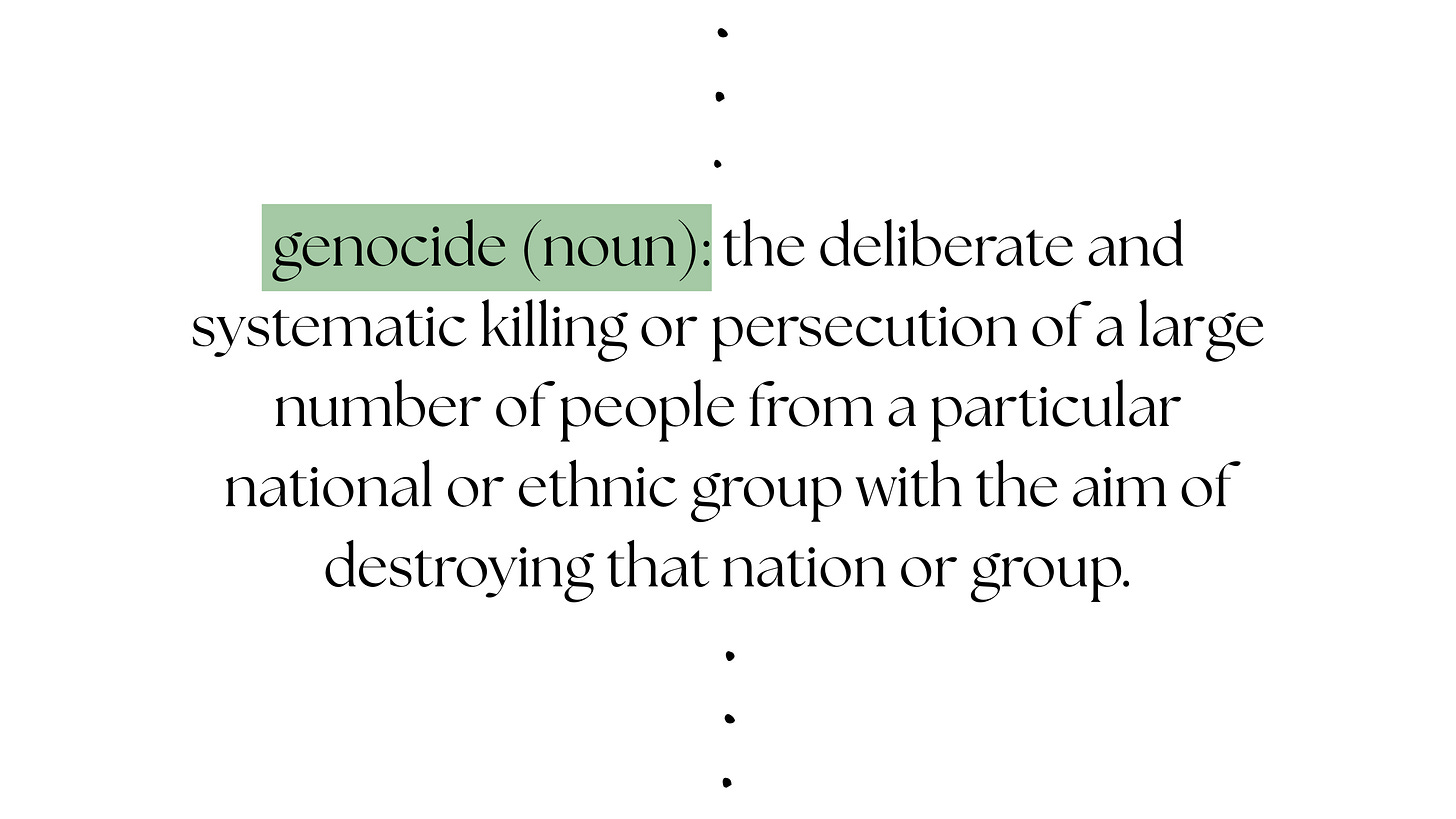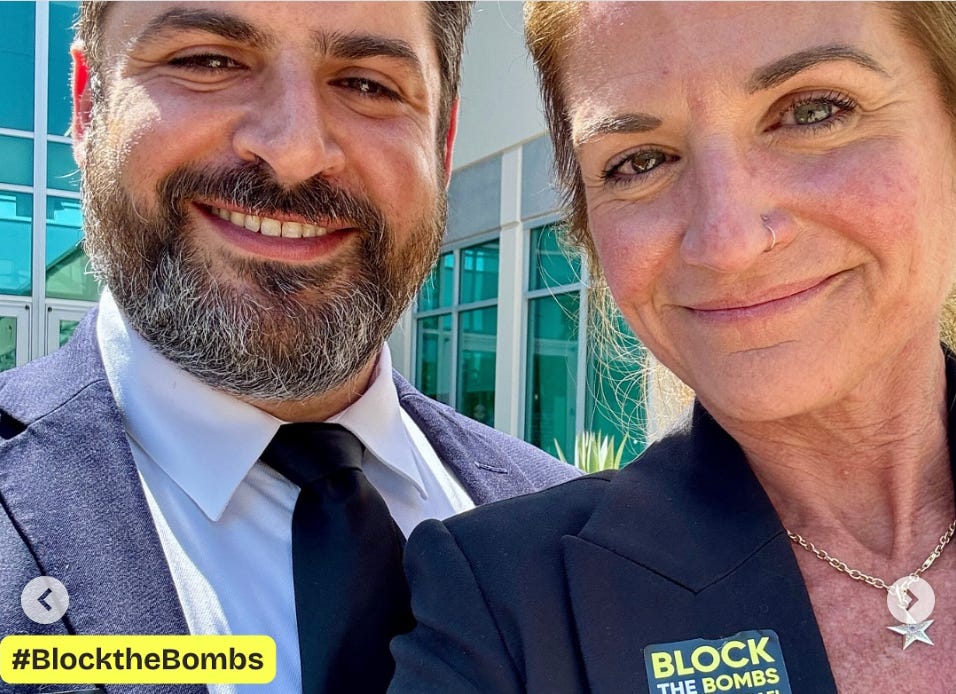When Votes Don't Count: Money vs. Democracy
Why your vote doesn't matter as much as corporate dollars, and musings about how we can reclaim democracy
Has anyone else been having sleepless nights recently, waking up in the middle of the night to ruminate about the ways in which democracy in the US is failing, and plotting big ideas about how you could help save it?
No? Just me?
Current events have been so overwhelming, so baffling, that I’ve been asking ‘why’ a lot to try to understand what’s going on. It has been eye-opening to trace back the whys, like doing an autopsy to determine the cause of death.
Two recent events or realizations have converged in my mind and crystallized into a bit of an epiphany about why everything sucks right now.
So follow me down the rabbit hole.
event one
At the end of July, Bernie Sanders introduced a bill in the Senate to try to block the sale of weapons to Israel. Out of a total of 47 Democratic senators, only 27 voted in favor of blocking aid to Israel. That's an improvement from previous attempts, but it still means 2 out of every 5 Democrats voted to keep sending weapons. Why?
To me, there has always been something strange and counterintuitive about the blind, bipartisan support Israel has amongst US politicians. Two parties that can’t agree on whether the sky is blue, and yet, for some reason, they’re united in their support of a random foreign government.
Even now, after two years, tens of thousands of lives, and a conflict that has now officially been classified by the UN as genocide, why, why, are so many US politicians still supporting this?
The simple answer: money + permissive legislation = disproportionate influence
To explain, let’s stick with Israel for a moment.
AIPAC (the American Israel Public Affairs Committee), a lobbying powerhouse that has been shaping U.S. policy on Israel since the 1950s, has been systematically funneling millions of dollars into campaign contributions and lobbying efforts across the political spectrum. Nearly every senator and representative, left and right, has taken their cash. It’s no mystery why so few dare to break ranks when you see the numbers yourself on Track AIPAC.
Here, the ‘why’ is clear: politicians are receiving money from a lobby group to vote in line with the group’s interests.
But what about the ‘how?’ Isn’t this the definition of bribery? Shouldn’t this be illegal?
Well, unfortunately, it IS legal, all because of a Supreme Court decision in 2010 that fundamentally rewrote the rules of politics. Citizens United v. FEC ruled that corporations have the same free speech rights as individuals, which means they can spend unlimited amounts of money to influence elections. This essentially legalized bribery (imo) and made corporations and lobby groups more powerful and influential than the very people politicians are supposed to represent—us.
event two
I recently watched this video from RepresentUs. It’s over six years old, but it remains incredibly relevant and explains how, for many years, our government has been failing at representing the will of the people. The dysfunction is bigger than the current administration, bigger than left versus right.
The video was centered around one highly impactful study:
In 2014, a study analyzed almost two thousand policy issues and found that economic elites (the wealthiest 1-10% of Americans) and organized business groups (corporate lobbying organizations) have massive impacts on public policy, while average citizens have virtually none.
To illustrate this, the study found that if there is 0% public support for a law, there’s a 30% chance that Congress will pass it. If there is 100% public support for a law, there’s still only a 30% chance that Congress will pass it.
By contrast, if economic elites and lobby groups strongly support a policy, there’s a 45% chance that Congress will pass it. And if there is strong opposition from elites and lobby groups, there is an 18% chance Congress will pass it.
In short, lobby groups and the wealthy have more influence over policy than the citizens politicians are constitutionally required to represent.
Despite how polarized our politics seem, when you actually look at the polling data, Americans agree on far more than our politicians would have you believe.
87% of Americans support requiring criminal background checks for all gun purchases, and 80% support mandatory mental health evaluations for gun buyers (this was a Fox News poll, no less)
63% of Americans support abortion being legal in all or most cases
60% of Americans are against sending further military aid to Israel, with opposition rising to 75% among Democrats specifically
And yet, despite clear majorities supporting these policies, our politicians consistently vote against the will of their constituents.
I am angry about this on a collective level moreso than an individual level. Even though I believe in abortion rights and gun control and blocking aid to Israel, if the majority of Americans disagreed with me, I wouldn’t be happy, but at least the system would be working as intended, with elected officials following their constituents' wishes.
But that’s not the reality right now. The reality right now is that we the people are not being listened to or represented. The politicians we elect are more concerned with serving their own interests above ours or the nation’s—and this is fundamentally NOT what democracy is supposed to be. Democracy is supposed to be a government of the people, by the people, for the people. Instead, what we have is a government of the people, by the corporations, for the corporations.
Part of the problem is that there is no accountability or repercussions for politicians. Most Americans are not politically engaged or simply don’t have the time or will to analyze how their representatives are voting. When election season comes, they vote for the person who represents their party, and what happens after that is out of sight, out of mind. The politician is mostly free to vote however they want with very limited oversight or scrutiny.
The other part of the problem is that there is no path forward in terms of advocacy when your politician is bought by a lobby group. If politicians were actually voting according to what their constituents wanted, there'd be a clear path forward: talk to your neighbors, hear their views, educate each other.
But what's your recourse when the politician has already been purchased? You could call their office, write letters, show up at town halls to plead your case. But you're not competing with other voters—you're competing with pharmaceutical companies, defense contractors, and AIPAC. Could you out-donate a multi-billion-dollar industry? Could you outspend a lobby group that's funneled millions into your representative? No.
So, how can we force accountability?
Glennon Doyle, a famous writer and activist who lives in California, has been very publicly calling for her state representative, Dave Min, to sign the Block the Bombs Act.
As I previously mentioned, 60% of Americans (and 75% of Democrats) oppose sending aid to Israel. Armed with this data, Glennon has been able to confront Dave Min (a democrat) to say: ‘This is how your constituency feels. What’s your excuse for voting against the wishes of the people you represent?’
Loud, sweeping, generalized advocacy efforts have not hit the mark or been effective. I think this type of activism is the only way forward right now: through small, targeted, grassroots campaigns to individually hold politicians accountable and to ensure they’re representing the people they’re supposed to.
In a world free from the limitations of cost, or bias, or complexity, I would say: let’s create a tool that would show you exactly how your community feels about a specific issue right when your elected official has to vote on it. This would create an immediate, undeniable moment of accountability, a compelling snapshot into whose interests your elected officials are actually serving.
But, we do live in a world full of aforementioned costs, bias, and complexity, so I think we’re left working with the information we already have. Thanks to polling data, we do know where Americans stand on healthcare, climate action, military spending, and countless other policies. Organizations like Pew Research and Gallup regularly capture public opinion; the data is there, sitting in reports and databases, waiting to be weaponized.
The missing part is PR—turning that data into sustained political pressure.
Glennon Doyle has a leg up in that she has a large platform and following, and I commend her for using it in the way she is. Most of us don’t have that, but we do have social media accounts, local networks, community groups, and the ability to show up at town halls with printed polling data in hand.
It feels flimsy. It feels like not enough.
But step one is awareness—it’s reading this post and watching this video and asking ‘why’ over and over until it’s clear. It’s realizing that things weren't always this broken and that the reason why it’s broken now is because our government has been systematically dismantled until it no longer serves the people who elect it.
Too long we have been complacent, happy to reap the rewards and freedoms of democracy, thinking we didn’t have to lift a finger to protect it or to make sure it was moving in the right direction. But that time of passivity is gone. Our government is not representing the people. It’s like a runaway train, out of control, barreling towards a dead end. We need to take back control.
This is bigger than polarity, this is bigger than left vs right, bigger than abortion rights or vaccine mandates, bigger than who the president is right now. This is fundamental: who is steering the ship? If the answer is not ‘the people,’ then democracy is not working, full stop.
So, tell me—was I just living under a rock and this is old news to you? Did you already know that corporations statistically have more political influence than voters? And most importantly, what's your take on how the hell we fix this mess?







